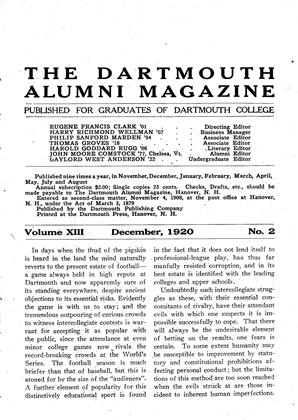On April 26, 1920, the faculty voted to accept the following recommendations of the Committee On Personal Ratings:
(a) That during the week ending June 5, each instructor in Dartmouth College fill out and file in the office of the Registrar a rating sheet containing his personal estimate of the men under his instruction made on a scale of five letter grades (A, B, C, D, E) on standard forms to be provided for this purpose.
(b) That in grading his men on the five traits called for, the instructor should be guided by the following definitions:
Intelligence: (Ability to grasp a situation; alertness of mind. Not to be identified with scholarship.)
Aggressiveness: (Personal force, initiative; assurance; decisiveness.)
Originality: (.Inventiveness; resourcefulness in proposing new problems; readiness in finding application of principles; fertility in making suggestions).
Reliability: (Evidence of solid character; dependability; sense of responsibility; perseverance; attentiveness; punctuality.)
Personality: (Bearing, neatness; courtesy: personal acceptability.)
(c) That each instructor be urged to acquire as substantial a basis for judgment as the nature of the case permits but also that no instructor should feel under a sense of strict compulsion to grade every man on every point. Where it is impossible for a real judgment to be formed, a blank is to be preferred to a forced opinion.
Conformably to the above recommendations members of the faculty submitted personal data concerning 1480 students. All the ratings were tabulated by the department of psychology, and the individual averages were transcribed to the permanent records in the office of the Associate Dean.
In the analysis of results four different degrees of uniformity of rating were indicated by a system of letters denoting the maximum variation in rating from one judge to any-other on the grading scale from A to E.
Intelligence was judged by three or more instructors in approximately 1300 cases. Aggressiveness in 1150 cases, originality in 750 cases, reliability in 1160 cases, and Personal Impression in 1200 cases.
It is reasonable to assume that the types of record in which all the judges were in agreement, or in which the variation was not more than two letter grades have a high probability in favor of their being approximately accurate and usable estimates. This assumption is borne out by the correspondence between the ratings of Intelligence of the men of the class of 1923 and the grades of those same men on the Army Alpha Intelligence Examination. This correspondence is indicated by the fact that of 104 men who were ranked B in Intelligence by three or more instructors 80 ranked higher than average on the Alpha test. And inasmuch as in only 15 per cent of the total number of cases was there variation in rating of more than two letter grades, it may be concluded that in five cases out of six the records now available have a very definite value.
It was the belief of the committee that the data already available justified the expectation that systematic personal rating will prove to be of great advantage to the college. The committee therefore recommended that the records be continued for the college year 1920-1921.
 View Full Issue
View Full Issue
More From This Issue
-
 Article
ArticleTHADDEUS STEVENS
December 1920 By FRED LEWIS PATTEE '88 -
 Article
ArticlePEN AND CAMERA SKETCHES OF HANOVER AND THE COLLEGE BEFORE THE CENTENNIAL
December 1920 By EDWIN J. BARTLETT '72 -
 Article
ArticleFOOTBALL
December 1920 -
 Article
ArticleIn days when the thud of the pigskin
December 1920 -
 Class Notes
Class NotesCLASS OF 1912
December 1920 By Conrad E. Snow -
 Class Notes
Class NotesCLASS OF 1910
December 1920 By Whitney H. Eastman








